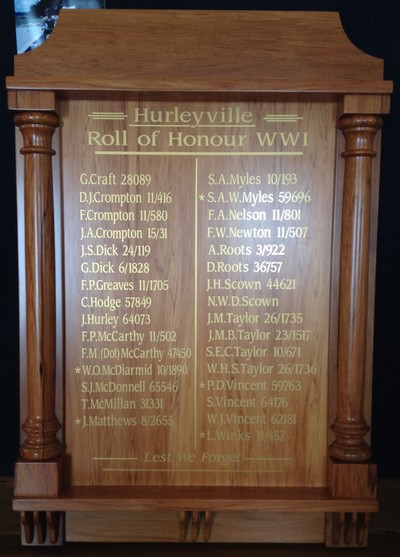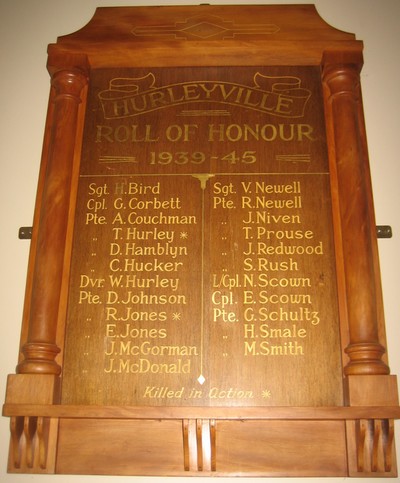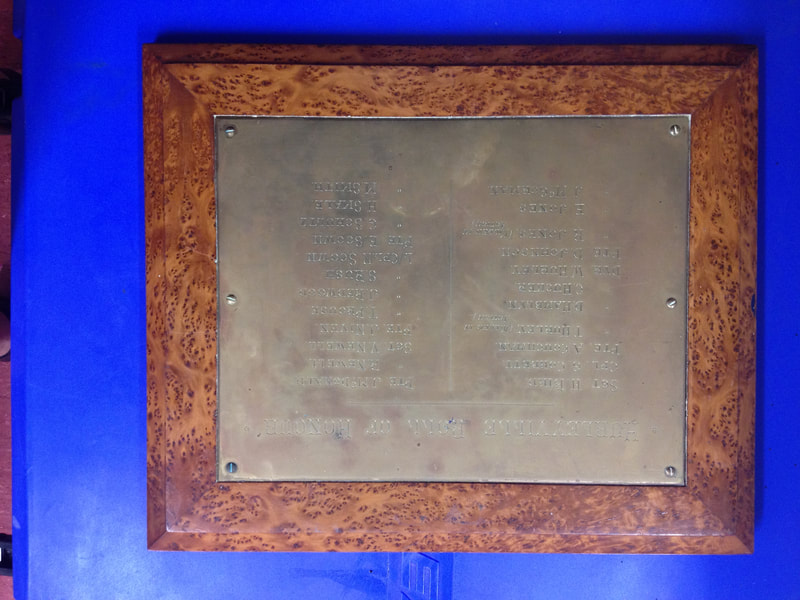|
Hurleyville Roll of Honour WWI
George CRAFT, Private, 28089 David John CROMPTON, Trooper, 11/416 Fred CROMPTON, Trooper,11/580 James Andrew CROMPTON, Trooper,15/31 John Shaw DICK, Rifleman, 24/119 George DICK, Private, 6/1828 Frederick Percy GREAVES, Trooper, 11/1705 Charlie HODGE, Trooper,57849 Joseph HURLEY, Private, 64073 Florence Patrick McCARTHY, (Florrie)Trooper,11/502 Francis Mortimer McCARTHY (Dot), Private, 47450 *William Orr McDIARMID, Private, 10/1890 Stephen Joseph McDONNELL, LanceCorporal, 65546 Thomas McMILLAN, Private, 31331 *John MATTHEWS, Private, 8/2655 Stanley Anderson MYLES, Private,10/193 *Sidney Austin Wilson MYLES, Private, 59696 Francis Arthur NELSON, Lieutenant, 11/801 Fredrick William NEWTON, Trooper, 11/507 Arthur ROOTS, Private, 3/922 Douglas ROOTS, Sergeant, 36757 John Henry SCOWN, Private, 44621 Norman Wallace Dutton SCOWN ?? James Mill TAYLOR, Rifleman, 26/1735 John Milton Ballance TAYLOR, Rifleman, 23/1517 Stanley Emmerson Carlisle TAYLOR, Private, 10/671 William Huxley Spencer TAYLOR, Rifleman, 26/1736 *Percy David VINCENT, Private, 59763 Stanley VINCENT, Private, 64176 Walter James VINCENT, Private, 62181 *Lawrence WINKS, Sergeant, 11/457 *Denotes: Killed in Action Hurleyville WWII Roll of Honour
Harold BIRD, Sergeant, George Seymour CORBETT, Corporal, 417517 Robert Arthur COUCHMAN, Private, 412314 *Tim Eugene HURLEY, Private, 44531 Douglas George Day HAMBLYN, Private, 70971, Charles Edward HUCKER, Private, 31741 William Owen(Bill) HURLEY, Driver, 295100 Allan Desmond JOHNSON, Private, 421523 *Hector Roy JONES, Private, 6804 Eric Arthur JONES, Private, 113458 James Francis McGORMAN, Private, 30737 Hilliar Jock McDONALD, Private, 73918 Verdon James NEWELL, Sergeant, 70498 Ronald Laing NEWELL, Private, 76142 James Bryan NIVEN, Private, 623723 Thomas Edwin PROUSE, Private, 45884 John Albert REDWOOD, Private, 32962 Stanley Roberts RUSH, Private, 16440 Nelson James SCOWN, Lance Corporal, 70536 Eric Thomas SCOWN, Corporal, 73945 George Alexander SCHULTZ, Private, 45887 Hughen SMALE, Private, 30043 Mick SMITH, Private, |
In the Hurleyville Hall there is an ornately carved rimu Roll of Honour board for the 23 men who went to WWII, but for some reason nothing was ever displayed for the 31 men who went to WWI. Five of these men were killed in action, & are listed on the Patea War Memorial. There is a list in the front of the Hurleyville Centennial Book, but it is missing three men, & doesn’t indicate that five were killed. So, the Hurleyville Hall Committee had Neil Carter make a matching Roll of Honour Board of these WWI names, & it was unveiled by the Hon Chester Borrows & Catherine Koubaridus at the 125th Jubilee in March 2017. Even though a century has passed since the WWI, it is never too late to remember them.
One of the five men that didn’t return was Bill McDiarmid. He enlisted around the same time as his good friend from Alton, George Mitchell. Bill had immigrated from Ireland a few years before and was working at the Hurleyville Dairy Factory when he enlisted at the age of 25 years in January 1915. By June of that year he had been sent to Gallipoli, two months after the slaughter of the Battle of the Landing on 25 April. Around the time of the Battle of Chunuk Bair, Bill went missing, and was found after the Battle with a bad GSW (gunshot wound) to his right shoulder and other shrapnel wounds. He was sent by Hospital Ship to Malta, then to Manchester England to recover from this major injury that had left his arm useless. It says on his War records that he had wanted to get back to NZ, but Ships were scarce & he had a long wait ahead. On the 7 April 1916, he walked out of the Convalescent Hospital never to be seen again. It is presumed he committed suicide. His friend George was killed in action in Flanders on the 5th of December 1917. I haven’t been able to find out much at this stage about the other three that died, but I do know that Percy Vincent, one of three Vincent brothers to go from Hurleyville, was killed near Pont-a-Pierres farms in France just 2 weeks before the War ended in 1918. Another set of brothers that enlisted from Alton were the Taylor brothers. James, John, Stanley & William arrived in Hurleyville in 1904, when their parents James and Jane Taylor bought the Store. They were all fortunate to return alive. William and Jessie Myles arrived in the district with their large family in 1913. Two of their older boys; Stanley & Sidney enlisted from Hurleyville. Sidney was killed in action on 4 November 1918 during the liberation of the village of Le Quesnoy. The Germans held Le Quesnoy for almost the entire war, from August 1914 through to its dramatic liberation on 4 November 1918. The New Zealanders scaled a ladder set against the ancient walls of the town and took the remaining Germans as prisoners. The liberation of Le Quesnoy was just one of the many campaigns that New Zealanders fought on the Western Front, the line that stretched across northern France and Belgium. Catherine Koubaridis gave me copies of the 1914 Ball Road Football Club photo & the fantastic official WWI portrait photo of her father Dick Hurley in his uniform before he went off to war. As Captain of the Football Team, he must have been a commanding, calming man. The Team did not know when this photo was taken in the winter of 1914, that in a few weeks the world would be at war, and before long at least 7 of them would be over there fighting in it. Dick fought mainly in France, and when he was wounded & needed knee surgery, he was fortunate enough to have legendary Patea Doctor Simmons attend to it. What a sight for sore eyes Dr Simmons would have been for any local boys who ended up in one of his Medic Stations over there. When the war finished, Dick went to Ireland to meet Hurley family members, his parents Daniel & Bridget had not seen since they left 40 or so years earlier. The influenza epidemic was rampant when he arrived there, & he spoke of the onions they would hang around the house to ward it off. Catherine’s older sisters remember their Dad going to the ANZAC Day service every year with his friend & fellow veteran Frank Thame from Hurleyville, but any other day of the year the war was not mentioned & busy farming days kept his life full. I’ve had insightful conversations with two Alton men - Newton Hodge (Alton WWII returned soldier) & Stuart Leigh (Alton’s oldest resident in 2015) who knew some of the Hurleyville WWI returned soldiers as older men. Newton’s 2nd cousin Merle Hodge was killed in WWI. When I asked Newton how they all felt about going off to fight in WWII, just over 20 years after WWI finished, he said it was just what had to be done, & there was never a thought about not going. And when he got back home he just put it all behind him and got on with life. Rugby was a game they would play over there, amongst other soldiers, against the South Africans, Australians etc. Great friendships were formed & he said they would give anything, but on the rugby field they would give nothing, - but intense competition. The association of Rugby & War is often compared & analysed. There is the famous "Christmas truce". A series of unofficial cessations of battle that occurred along the Western Front during Christmas 1914. WWI had been going for several months but German and Allied soldiers stepped out of their trenches, shook hands and agreed to a truce so the dead could be buried. The soldiers also used that truce to chat with one another and, some claim, even play a football match. Unofficial truces between opposing forces occurred at other times during World War One but never on the scale of that first Christmas truce. As a Highland Regiment officer said in The Times in 1915: "It is a great hope for future peace when two great nations hating each other as foes have seldom hated, one side vowing eternal hate and vengeance and setting their venom to music, should on Christmas day and for all that the word implies, lay down their arms, exchange smokes and wish each other happiness." The loyalty & camaraderie soldiers had for one another remained strong even when they returned home and got back to their civilian lives. Dot McCarthy is one man who showed this in his own discrete way. When he heard about the plight of a fellow Taranaki Soldier, Tom Ross, who he first met in the trenches on the Western Front, having to walk off his Ballot farm in Whangamongama in the 1920’s. He contacted him & asked if he would like to return to his pre-war work of carpentry & then found work for him building sheds and houses on his & friends farms for the rest of his working life, & eventually had a house built for him in Kakaramea to retire to. Dot & his brother Florrie, two well known farming brothers, went to WWI from Hurleyville. Their father Patrick was one of the first settlers in Hurleyville in the late 1870’s, & cleared his farm from the bush on Wilford Rd. Rex Cole told me many stories of his Uncle Dot, this unassuming, yet high achieving man, who helped finance many young men into farms, and the purchase of stock without fuss or fanfare. One story tells of the time when he was meant to meet a stock agent, Keith Newland, in Kakaramea to drive to Hawkes Bay to a big sheep sale. After half an hour of waiting, Keith drove up to Hurleyville to find Dot docking lambs. Dot had forgotten about their trip. But without hesitation he jumped in the car with Keith, still in farm clothes splattered with blood, & headed to the Hawkes Bay. They stopped at a clothes shop in Wanganui to fit Dot out in some new threads for the Sale. Dot didn’t have time to get his wallet before they left Hurleyville, but convinced the storekeeper to accept the cheque he had written on a piece of his cigarette box. Dot, as usual, never did look like the successful farmer that he was, but the cheque was cleared, & they did make it to the sale, with Dot no doubt buying a train load of under feed weaners to send to some farming friend somewhere in the north island to fatten up. Doug Roots is another successful Hurleyville WWI returned Soldier. He was one of the 25 first day pupils enrolled at Hurleyville School when it opened in 1892. His father Thomas Roots was another of the first men in Hurleyville to start clearing the bush on his farm on Clifford Road in the late 1880’s. Doug & his brother Arthur both went to WWI. Kevin Hurley told me that Doug returned to Hurleyville after the War, farmed there for a time, & later owned a grocery shop in Patea where The Four Square now is. But that was only part of his life...in his early years before the War, he was a member of the Hurleyville Rifle Club, and after the War he went on to travel to several countries competing with huge success in rifle shooting competition matches. On four occasions he won the NZ Rifle Champion Belt (Ballinger Belt) & was selected as a member of NZ teams which competed in England & Australia. No doubt he would have been a very precise and focused soldier, and his rank of Sergeant in WWI shows this was recognised by the military. There is also the sadly common situation of returned men struggling to fit into life back home after the War. John Hutchinson Bowie bought 60 acres with his older brother Alex, on Clifford Road in Hurleyville, when they both returned from WWI in 1919. John enlisted in 1915 at the age of 31 and spent three and a half years overseas, fighting. And Alex was called up in 1917, having to leave their widowed mother to run the family farm at Auroa. By the time John reached the Western Front in late 1916, he had suffered all the usual casualties faced in trench warfare, including GSW’s, shrapnel & severe diarrhoea, which often killed these resilient men in the mud of the battlefield. In mid 1917 he had a nervous break down, and spent time at a General Hospital in France. He recovered and went back to the trenches. Throughout the course of the War, and in spite of all these injuries and ailments, he was promoted from a Private, to a Corporal to Lance Sergeant, then finally to a Sergeant in late 1917 until the end of the War. On his War records, it states that he was mentioned in dispatches by Field Marshall Sir Douglas Haig, on the 8/11/1918, for ‘distinguished and gallant service and devotion to duty during the period 25/2/1918 – 17/9/1918’. We can only imagine the anguish that must have followed John home, he would have seen hundreds of his fellow soldiers killed, and somehow he survived it all…until 1938. When he took his own life at the age of 54, back in his hometown of Auroa, at the home of old family friends, the Hermann’s. John had remained a bachelor, working hard on his farm, fitting into the community, and no doubt never talking about ‘his War’. There is an old proverb that says you die twice...firstly at the moment you draw your last breath, and secondly when your name is said for the last time. We are grateful for John’s courage, and he will be remembered here in Hurleyville, the place he spent many years of his life. Hurleyville would have been a quieter place for a while during the War years, waiting for their men to come back, to take over again, the farms they worked so hard on. What a bitter sweet night it would have been at the special Banquet held at the Hurleyville Hall on Wednesday 5 November 1919 when the community officially welcomed them home. |
PATEA HISTORICAL SOCIETY
-
Home
-
History
>
- Early Maori
- Early Pakeha.
-
Mayors of Patea
>
- Mr George F Sherwood
- Mr John Milroy
- Mr Robert A Adams
- Mr John Gibson
- Mr Charles Finnerty
- Mr William Cowern
- Mr James A McKenna
- Mr Herbert O Clarke
- Mr George Williams
- Mr Adolph Theodor Christensen
- Mr Charles A Larcombe
- Mr John J Holthom
- Mr P P Scott Finlayson
- Mr Fred Ramsbottom
- Mr Edward F H Hemingway
- Mr Alexander H Langslow
- Mr Guy W T Corbett
- Mr Allan Henry Prince
- Mr R Gordon Hughson
- Mr Norman Alec Kenneth Mackay
- Schools
- Patea Press
- Hospital
- Cemetery's
- Churches
- Freezing Works
- Patea Freezing Works Display
- Cool Stores
- Shipping
- SS Waitangi Wreck
- Patea Beach
- Patea Power Station
- Railway
-
History
>
-
War Memorials
- Alton WWI Memorial
- Alton WWII Soldiers
- Alton Hotel Soldiers Penny Board
- Hurleyville WWI & WWII Soldiers
- Kakaramea WWI Memorial
- Kakaramea WWII
- Manutahi WWI Memorial
- Manutahi WWII Soldiers
- Meremere WWI & WWII Memorial
- Ngamatapouri WWI Memorial
- Patea WWI Memorial
- Patea WWII Memorial
- Whenuakura WWI & WWII Soldiers
- Waitotara WWI Memorial
- Waitotara WWII Soldiers
- Waverley WWI Memorial
- Waverley WWII Soldiers
- About Us
- Events
- Contact



